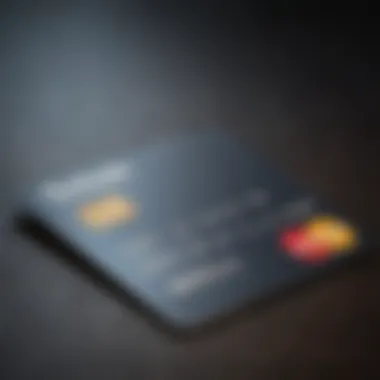Top Credit Cards for Those with Poor Credit Ratings


Intro
Navigating the world of credit can be challenging, especially for individuals with bad credit. The stigma associated with poor credit scores can often feel overwhelming, limiting financial opportunities. However, there are credit cards designed specifically for those in this situation. Understanding these options along with their features and benefits is crucial for making informed decisions.
This article will explore the best credit card options available to individuals with bad credit. We will cover key aspects such as fees, interest rates, and credit limits. Furthermore, tips for improving credit scores will also be discussed.
By assessing the features of various credit cards, this guide aims to provide insight into better financial decision-making, particularly for young professionals, families, and students.
Overview of Financial Product
Definition
A credit card is a financial tool that allows individuals to borrow funds from a pre-approved limit to make purchases. For those with bad credit, these cards often have specific terms tailored to their financial situations.
Key Features
- Low Initial Credit Limit: Many cards provide a lower credit limit to manage risk.
- Higher Interest Rates: These cards frequently come with higher annual percentage rates (APRs) compared to standard cards.
- Various Fees: Fees can include annual fees, late payment fees, and over-the-limit fees.
Purpose and Benefits
Credit cards for individuals with bad credit can serve as a step toward rebuilding credit. Utilizing these cards responsibly can lead to improved credit scores over time. Here are a few benefits:
- Credit Score Improvement: Regular, on-time payments can contribute positively to credit scores.
- Financial Flexibility: These cards offer a way to make purchases even when cash flow is limited.
- Build Credit History: Establishing a usable credit account can help develop a more robust credit profile.
Types and Categories
Credit Card Types
Credit cards for individuals with bad credit can fall into several categories:
- Secured Credit Cards: Require a deposit that serves as collateral.
- Unsecured Cards: Do not require a deposit but may have specific qualifications.
- Store Credit Cards: Offered by specific retailers and have less stringent approval requirements.
Pros and Cons
Pros
- Access to credit.
- Opportunities to rebuild credit.
- Often low approval standards.
Cons
- High-interest rates.
- Potential fees.
- Limited credit limits.
Situational Uses
Individuals with bad credit might seek these cards for everyday purchases, emergencies, or even while rebuilding their finances after setbacks.
Application Process
Steps to Apply
- Research Options: Find cards that fit your unique needs.
- Check Eligibility: Review the requirements for each card.
- Complete Application: Fill out the necessary forms online or in-person.
- Submit Required Documents: Provide identification and financial information.
Eligibility Requirements
Most issuers look for:
- Age of 18 or older.
- Residency and citizenship status.
- Basic income requirements.
Documentation Needed
- Valid identification (e.g., driver’s license).
- Proof of income or employment.
- Social Security Number.
Common Mistakes to Avoid
- Applying to too many cards at once can negatively affect credit scores.
- Overlooking fine print and fees.
- Failing to check credit reports before applying.


Tips for Success
- Focus on secured cards for initial approval.
- Make timely payments to avoid late fees and higher interest rates.
- Monitor spending to remain within limits.
Costs and Fees
Types of Fees Associated
Credit cards often come with various associated fees, including:
- Annual Fees: Charged yearly for card usage.
- Late Payment Fees: Penalized if payment deadlines are missed.
- Over-the-Limit Fees: Incurred if spending surpasses the approved limit.
Interest Rates and APR for Loans/Cards
Interest rates are often higher for cards aimed at those with bad credit. Be cautious of how much interest will accrue on unpaid balances. Always review the APR before applying.
Knowing these elements can better prepare individuals to make informed choices. Financial wellness is within reach, even for those with challenging credit histories.
Understanding Bad Credit
Understanding bad credit is a crucial first step for individuals seeking to improve their financial situation. It lays the groundwork for choosing the right credit card and effectively managing debts. Knowing what constitutes bad credit and its implications can help one make informed financial decisions.
Definition of Bad Credit
Bad credit refers to a low credit score, often below 580 according to the FICO scoring model. Credit scores are numerical representations of an individual’s creditworthiness, derived from their credit history. A low score indicates that a person may have difficulty repaying debts, which can influence lending decisions significantly. A low score can arise from various issues, including missed payments, high credit utilization, or bankruptcy.
Causes of Bad Credit Scores
Various factors contribute to poor credit scores. Some of the most common causes include:
- Missed Payments: Payment history is a major component of credit scores. One or two missed payments can negatively impact your score for several years.
- High Credit Utilization: Utilizing too much of your available credit can signal to lenders that you may rely too heavily on borrowed money.
- Bankruptcy: Filing for bankruptcy drastically lowers a credit score and remains on one’s credit report for up to ten years.
- Too Many Hard Inquiries: Each time you apply for credit, a hard inquiry is recorded. Too many inquiries can suggest that you are a high-risk borrower.
- Old Accounts in Collections: Unpaid debts that have been sent to collections can significantly impact your score.
These factors illustrate the various pathways that can lead to bad credit.
Impact of Bad Credit on Financial Options
Having bad credit can severely limit one’s financial options. The ramifications include:
- Higher Interest Rates: Credit cards and loans often come with increased interest rates for those with poor credit, translating to higher repayment amounts over time.
- Limited Access to Credit: Many lenders disregard applications from individuals with bad credit, reducing the options available.
- Difficulty Securing Housing: Landlords often check credit scores before renting. Poor credit can hinder the ability to secure housing.
- Higher Insurance Premiums: Some insurance companies use credit scores to determine premiums. Lower scores can result in higher rates.
In summary, a strong understanding of what bad credit entails, the reasons behind it, and its implications can be empowering. It positions individuals to better navigate their financial landscape and seek suitable credit options that align with their needs.
Understanding bad credit creates awareness, allowing individuals to make empowered and informed choices about their financial futures.
Key Features of Credit Cards for Bad Credit
Understanding the key features of credit cards designed for individuals with bad credit is crucial. With limited options available, it's important to know what to look for when selecting a card. This section delves into the essential characteristics of such cards, focusing on annual fees, interest rates, security deposits, and credit limits. Each of these elements has direct implications on one’s financial wellbeing, particularly when trying to rebuild credit.
Annual Fees
Annual fees are a common charge that can influence the total cost of a credit card. For individuals with bad credit, many credit cards come with higher annual fees compared to traditional cards. These fees can range significantly, from $0 to several hundred dollars. It is wise to assess whether the features and benefits of the card justify the annual fee.
The right choice may involve choosing a card with no annual fee, especially for those actively trying to improve their financial profile.
When considering annual fees, be sure to read the terms carefully. Sometimes, cards advertise tempting promotional offers that might exclude this fee for the first year but will apply afterward. Therefore, knowing upfront costs is essential for budgeting purposes.
Interest Rates
Interest rates are another vital aspect to consider when selecting a credit card. Individuals with bad credit are more likely to face high-interest rates. This can be a significant financial burden, particularly if the card is not managed well. It is advisable to aim for the lowest rate possible while using a credit card.
Annual percentage rates (APRs) can vary widely among different credit cards, and they often reflect the level of risk the lender associates with the applicant. For those looking to build or rebuild credit, managing these interest rates efficiently can decrease the total cost of borrowing money when necessary.
Security Deposits
Security deposits are frequently a requirement for secured credit cards. Unlike unsecured cards, which do not require any upfront payment, secured cards require a cash deposit that also serves as a credit limit. This deposit acts as collateral for the lender.


The amount of the security deposit typically ranges from $200 to $500, depending on the credit card issuer. It’s crucial to understand the implications of this deposit. It helps reduce the risk for the bank while offering individuals a chance to rebuild their credit score with responsible use.
Credit Limits
Credit limits on cards for individuals with bad credit are generally lower than those for customers with better ratings. This limit is often determined by the issuer and can reflect your deposit amount on a secured card or other factors in the application process.
Low credit limits can be beneficial as they encourage responsible spending, which is essential for rebuilding credit. However, it is also necessary to ensure that the limit is sufficient enough to cover regular expenses, allowing for optimal credit utilization. Credit utilization should ideally remain below 30% of the available credit limit to positively impact the credit score.
In summary, understanding these key features can aid individuals in making informed choices. The ultimate goal is to select a credit card that not only meets their immediate financial needs but also supports long-term credit score improvement.
Types of Credit Cards for Bad Credit
Understanding the types of credit cards available for individuals with bad credit is crucial. Each type serves different needs and comes with its own set of features. For those looking to rebuild their credit, it's important to choose the right card that aligns with their financial situation.
Secured Credit Cards
Secured credit cards are often the first option for individuals with bad credit. These cards require a security deposit, which acts as collateral and determines the credit limit. For example, if a user deposits $300, that typically becomes their credit limit.
The benefits of secured cards include:
- Potential to build credit: Regularly making payments can help improve credit scores.
- Reporting to credit bureaus: Many secured cards report to major credit bureaus, essential for tracking progress.
- Cantrol over spending: Users cannot spend beyond their limit, which helps in managing finances.
However, there are considerations, such as the initial deposit requirement and possible fees associated with the card.
Unsecured Credit Cards
Unsecured credit cards are available for individuals with bad credit as well. Unlike secured cards, these do not require a deposit. Instead, the card issuer grants a small credit limit based on the applicant's credit history.
The advantages include:
- No deposit required: Easier access to credit without upfront costs.
- Flexibility: Can be used wherever credit cards are accepted without concerns about limitations based on a deposit.
Nevertheless, users may face higher interest rates and fees compared to secured cards. It's important to read terms and conditions carefully.
Store Credit Cards
Store credit cards can also be an option for people with bad credit. These cards are typically issued by specific retailers and can be used only at that store. They usually come with specific benefits, such as discounts or rewards on purchases.
Key aspects include:
- Easier approval: Retailers often have more lenient criteria for approval.
- Incentives for usage: Many offer rewards or cash back on in-store purchases.
However, it's essential to note that they often come with high-interest rates. Those not paying off balances quickly can find themselves in a difficult financial situation.
Understanding these types of cards allows individuals to make informed decisions. Each option provides unique benefits and challenges. Knowing what suits one's financial goals is essential in taking steps toward better credit.
Top Credit Cards for Individuals with Bad Credit
Navigating the world of credit cards can be challenging, especially for individuals with bad credit. However, selecting the right credit card can significantly impact your financial future. Credit cards for bad credit are designed to help rebuild credit scores, provide financial flexibility, and offer a pathway to better credit options in the future. It is important to understand the terms, fees, and benefits associated with these cards to make an informed decision.
Discover it Secured Card
The Discover it Secured Card is a well-regarded option for those looking to improve their credit. It requires a security deposit, usually equal to the credit limit. This card reports to all three credit bureaus, which is critical for building credit history. One standout feature is its cash back rewards program, allowing cardholders to earn 2% cash back on up to $1,000 spent at restaurants and gas stations each quarter, and 1% on all other purchases.
Moreover, Discover matches all cash back earned during the first year, effectively doubling your rewards. Importantly, after responsible use, the issuer may transition a secured cardholder to an unsecured card, providing further credit opportunities. This offers a clear incentive for users to manage their finances responsibly.
Capital One Secured Mastercard
The Capital One Secured Mastercard is another solid choice for individuals working to rebuild their credit. It also requires a security deposit. However, what sets it apart is the flexibility regarding the deposit amount, which can start as low as $49, $99, or $200, depending on your creditworthiness.
This card offers the benefit of no annual fee, making it easier for users to manage their finances. Additionally, Capital One provides access to a higher credit limit after making your first five monthly payments on time, which can further bolster your credit profile. Customers can also monitor their credit scores for free, providing insights into their credit-building journey.
OpenSky Secured Visa
The OpenSky Secured Visa is distinct due to its lack of a credit check during the application process. This is beneficial for those worried about being declined due to bad credit. Similar to the other options, it requires a security deposit which determines the credit limit.


The card does have an annual fee, although some users find this reasonable considering the services provided. Unlike many cards, OpenSky does not allow for cash advances, which promotes responsible spending. Cardholders also enjoy a user-friendly online account management system that aids in tracking spending and payments. Furthermore, it reports to major credit bureaus, providing an opportunity to improve one's credit score with responsible use.
Selecting the right credit card as an individual with bad credit involves careful consideration of available options. Each of these cards has unique features that cater to different needs while helping users rebuild their financial credibility.
How to Choose the Right Credit Card
Choosing the right credit card can make a significant difference for individuals with bad credit. The card you select not only affects your financial position but also impacts your credit score over time. Therefore, it’s vital to understand the aspects to consider in this process. The right credit card can help you rebuild your credit, while the wrong one may lead to further financial strain.
Assessing Your Financial Situation
Before selecting any credit card, it is crucial to assess your current financial situation. This includes evaluating your income, monthly expenses, and existing debts. Take a moment to reflect on the following:
- Monthly Income: Understanding how much you earn helps to determine your repayment capability.
- Expenses: List out essential and non-essential expenses to see where your money goes each month.
- Existing Debts: Consider any current loans or credit obligations you have. High debt levels may indicate the need for a card with lower fees or riskier terms.
By monitoring these factors, you equip yourself with necessary insights, ensuring you choose a credit card that aligns with your budget and financial capacity. This structured assessment helps in mitigating future financial issues and avoiding credit mishaps down the road.
Identifying Your Goals
Once you have a clear picture of your finances, the next step is to identify your financial goals. Every individual may have different aspirations regarding their credit usage. Here are some typical objectives:
- Rebuilding Credit: If your primary aim is to improve your credit score, seek out cards that report to credit bureaus effectively.
- Managing Expenses: For others, operating within a strict budget might be essential. Choosing a card with no hidden fees and lower interest rates will help in this consideration.
- Rewards or Benefits: Some may want benefits like cash back or points, when applicable. Understanding your priorities will help narrow down your options.
Clearly defining your goals sets a roadmap for your financial future. This clarity will direct you toward a credit card that not only fits your current needs but also supports your growth in credit management. Remember, informed decisions are fundamental in ensuring long-term financial health.
“Choosing the right credit card is a stepping stone towards better financial health; take your time and make informed choices.”
Improving Your Credit Score
Improving your credit score is pivotal for anyone dealing with bad credit. A higher credit score allows individuals to access better financial products and terms. This section will dive deep into methods to enhance your credit standing. Focusing on specific actions can drastically change your financial landscape, especially in the realm of credit cards.
Paying Bills on Time
Timely bill payment is one of the most significant factors affecting your credit score. Each time you miss a payment, it is reported to the credit bureaus. This can reduce your score substantially. Setting reminders or using automation can assist in ensuring you remain punctual with payments.
- Set Up Automatic Payments: These are helpful, especially for recurring bills like utilities or credit cards. However, ensure sufficient funds are in your account to avoid overdraft fees.
- Utilize Tech Tools: Apps can alert you before a payment is due, providing a digital nudge to stay on track.
- Prioritize Due Dates: If you have multiple bills, understand when each one is due, allowing you to manage your cash flow effectively.
Consistently paying bills on time signals to lenders that you are reliable, thereby positively influencing your credit score.
Keeping Credit Utilization Low
Credit utilization reflects the ratio of your current credit card balances to your credit limits. Keeping this ratio low is essential. Ideally, you should aim to keep it below 30%. Here are some approaches to do this:
- Pay Off Balances Regularly: Monthly payments help decrease your utilization rate.
- Request Credit Limit Increases: Higher limits, if managed responsibly, will thus lower your utilization.
- Separate Needs from Wants: Focus on using credit for essential purchases rather than frivolous spending.
By managing your credit utilization effectively, you exhibit responsible credit behavior that boosts your score.
Monitoring Your Credit Report
Regularly monitoring your credit report is vital. Errors might exist that can unfairly damage your score. Using your free annual credit report can help you spot inaccuracies or suspicious activities.
- Check for Errors: Look for mistakes like payments marked late that you made on time.
- Identify Fraudulent Accounts: If you see unfamiliar accounts, it might imply identity theft.
- Understand Your Score: Familiarize yourself with what influences your score so you can target improvements in weak areas.
Maintaining a keen eye on your credit report is essential. Awareness of your credit situation provides the insight needed to make strategic improvements.
The End
In the aftermath of exploring credit cards tailored for individuals with bad credit, it becomes clear how crucial understanding this topic is. The appropriate credit card can open doors to better financial management and stability. Credit cards serve not only as a tool for transactions, but they can also play a significant role in rebuilding one’s credit score.
A few vital elements need consideration when selecting a credit card. The level of annual fees, the interest rates, and the necessity of a security deposit can greatly affect one’s financial situation. Each of these features has implications on the usability and overall expense of the card.
Final Thoughts on Credit Options
Choosing the right credit card is essential, especially for individuals dealing with bad credit. It’s not merely about gaining access to funds but also about how these financial instruments fit into a broader strategy for credit restoration. Some credit cards may come with tools for tracking spending or educational resources to help users navigate their finances better. Thus, determining personal needs and evaluating each option can lead to making a more informed decision.
Regular use of a secured credit card, for example, can positively impact one's credit history when managed properly. This means not exceeding the credit limit and making timely payments. People should take care to compare the various credit card options available to them, considering their unique financial circumstances.
The Importance of Financial Education
Financial literacy plays a crucial role in using credit wisely. Understanding the implications of carrying a balance or making late payments can greatly influence one's credit score. Various educational resources are available to help individuals grasp how credit works, including tools on how to use credit cards responsibly. Access to this knowledge aids in motivation to improve financial habits.
Moreover, communities often support individuals seeking financial education. Online resources, community classes, and financial advisors can provide guidance. For those struggling with bad credit, taking proactive steps toward education and improvement can transform financial lives.
Ultimately, a commitment to learning and informed decision-making will lead to a better financial future. It is within reach for those motivated to take the necessary steps towards improvement.



